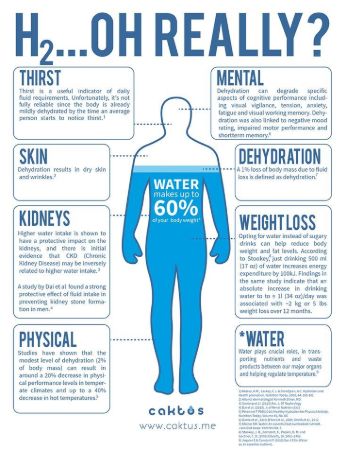
The Warning Signs of Dehydration
Most people don't realize that a dry mouth and throat signals the onset of dehydration. That's why experts recommend drinking water before thirst sets in to maintain proper fluid levels in the body all day long.
Each day the body loses about 10 cups of fluid through the digestive process, perspiration and moisture lost with each exhaled breath. The fluid lost due to these normal bodily functions must be replaced in order for the body to work properly, and the best, most direct replacement is pure H2O. For the average person, a general rule of thumb is to drink 8-10 8-oz. glasses of water each day. However, if you are very active or drink caffeinated or alcoholic beverages, which are dehydrating, even more water is needed to balance the body's fluid levels. Children and seniors require special care because their thirst mechanisms are not as sensitive as others are. Therefore, it is especially important for them to drink enough cool water, particularly when the weather heats up. The body can draw fluids from solid foods, too. In a normal diet, solid foods provide an estimated 3-4 cups of water daily. However, nutritionists suggest only counting fluids when evaluating your body's needs.
Dehydration can be very serious. In severe cases, a trip to the hospital may be necessary to replenish fluids intravenously. But even the mildest cases of dehydration should be addressed immediately. Low levels of fluid loss can affect the mind's ability to concentrate, reduce energy levels and prevent organs from functioning efficiently. Proper hydration should be taken seriously. Bottled water provides a great-tasting, pure and healthy way for you to keep your body feeling strong. To add a little variety, try adding a slice of lemon, lime, or a dash of fruit juice to your water. Avoid dehydration and keep your body functioning at its peak – make water an important part of your daily diet.
Symptoms of dehydration:
Lightheadedness
Dizziness
Muscle cramps
Thirst
Dry skin
Nausea
Headache
Fatigue that comes on suddenly
Voiding small amounts of urine that is darker in color than usual
Proper Hydration During Exercise
The body's need for water increases during periods of heightened activity. But it is important to remember that proper hydration should be maintained before, during and after any period of physical exertion, and experts say that water is the best option.
Here are some tips to help you get the most out of your workout:
Two hours prior to exercising, drink at least two 8-oz. glasses of water
One hour later, drink at least one 8-oz. glass
Bring water along with you – when exercising, drink at least 8 oz. of water every 15-20 minutes
After an activity, drink at least two more 8-oz. glasses of water
Facts: Water and Your Body
Next to oxygen, water is the most important nutrient that the body needs to function. The adult body is made up of approximately 70 percent water. For a person of average size, this equates to about 10-12 gallons of water! Water plays a vital role in nearly every function of the body. Water helps...
Regulate body temperature
Carry nutrients throughout the body
Moisten and purify the skin
Improve the digestive process
Eliminate waste
Lubricate and cushion joints
...and so much more
Blood is 83% water
Muscle is 73% water
Fat is 25% water
Bone is 22% water
Protecting Your Child from Dehydration
Little ones need plenty of water for their busy bodies, especially on hot days. When planning outdoor activities, be sure to pack a bag filled with snacks, sunscreen, a hat and plenty of cool water. To prevent dehydration on hot days, it is best to limit outdoor activities to the cooler times of the day – avoid the hours of 10 am-3 pm.
For the child who doesn't want to drink water, try the following:
Use colorful and interesting-looking plastic cups, sports bottles or sippey cups
Create your own packaging – personalize your child's special cup or bottle by adding his/her name, along with a fun design
Try using straws in bright colors and crazy shapes – your child will get a thrill out of watching the water wind its way through all of the loops and curves
Keep the water cool – especially on a hot day
Limit beverage choices – try not to stock the fridge with a lot of tempting sugar- and caffeine-filled drinks that could derail your efforts
Be a good example by drinking plenty of water, too!
Try adding a slice of fruit – this is tasty and fun for kids!